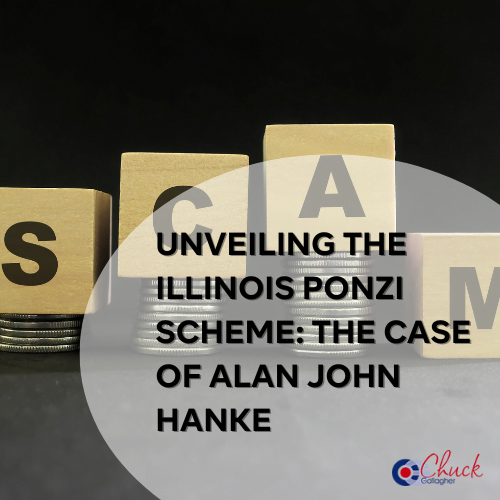 Years ago, I reported on the wily escapades of Dan Frishberg, the self-proclaimed “Money Man” of BizRadio fame in Texas. His fraudulent activities included promising high returns on investments that never materialized and using investor funds for personal expenses. I was reminded of his story when I saw today’s report that James McDonald had been captured. McDonald, who once appeared as a reputable analyst on CNBC, was finally captured after being charged with orchestrating a complex investment fraud. His fraudulent activities involved misrepresenting investment opportunities and diverting funds for personal use.
Years ago, I reported on the wily escapades of Dan Frishberg, the self-proclaimed “Money Man” of BizRadio fame in Texas. His fraudulent activities included promising high returns on investments that never materialized and using investor funds for personal expenses. I was reminded of his story when I saw today’s report that James McDonald had been captured. McDonald, who once appeared as a reputable analyst on CNBC, was finally captured after being charged with orchestrating a complex investment fraud. His fraudulent activities involved misrepresenting investment opportunities and diverting funds for personal use.
In a surprising turn of events, financial adviser James McDonald, who once appeared as a reputable analyst on CNBC, was finally captured after being charged with orchestrating a complex investment fraud. His arrest has sparked discussions about the vulnerability of even the most trusted media platforms to deceptive individuals. This story eerily parallels the notorious BizRadio scam led by Dan Frishberg, highlighting how both individuals exploited media exposure to perpetrate their fraudulent schemes.
James McDonald: The Deception Unveiled
James McDonald, CEO of Hercules Investments, was once a regular face on CNBC, providing financial advice and market analysis. However, behind his confident demeanor and seemingly sound advice, lay a web of deceit. McDonald is accused of defrauding investors out of millions of dollars through a series of misrepresentations and false promises. His scheme involved promising high investment returns, which he never intended to deliver. Instead, he diverted the funds for personal use, leaving his investors with significant losses. This betrayal of trust serves as a stark reminder of the need for vigilance in the financial industry.
McDonald’s arrest has sent shockwaves through the financial community, raising urgent questions about media outlets’ due diligence practices and the extent to which they vet their financial experts. This incident underscores the crucial role that media platforms play in either preventing or enabling financial fraud.
The Media as a Tool for Fraud
McDonald’s ability to maintain a facade of credibility through his media appearances is reminiscent of Dan Frishberg’s tactics during the BizRadio scam. Frishberg, known as “The Money Man,” used his radio platform to lure investors with promises of substantial returns. Both men leveraged their media presence to build trust and credibility, making it easier to attract unsuspecting investors.
Dan Frishberg: The BizRadio Scandal
Dan Frishberg’s BizRadio network was a Houston-based radio station broadcasting financial advice. Frishberg, along with his associates, used the platform to solicit investments for various funds, promising high returns that never materialized. Instead, they apparenetly used the funds for personal expenses and to pay off earlier investors, a classic Ponzi scheme tactic. Frishberg lost his investment licenses but was never charged for fraud although his victims pushed the US Attorney for action.
Key Similarities in the Scams
- Media Exposure: McDonald and Frishberg capitalized on their media appearances to build a trustworthy image. McDonald’s regular spots on CNBC and Frishberg’s radio show on BizRadio were powerful tools for attracting and reassuring investors.
- False Promises: Both men promised high returns on unrealistic and unsustainable investments. They used persuasive communication to convince investors of the legitimacy of their schemes.
- Misappropriation of Funds: Instead of investing the funds as promised, McDonald and Frishberg diverted the money for personal use and to cover other financial obligations, leading to significant financial losses for their investors.
- Legal Repercussions: The SEC, a key regulatory body, was crucial in investigating and charging both individuals. Their legal battles aimed to recover the defrauded funds and compensate the victims, highlighting the importance of such regulatory bodies in combating financial fraud.
Lessons Learned
The cases of James McDonald and Dan Frishberg underscore the importance of thorough vetting by media outlets and due diligence by investors. Media platforms must ensure that their featured experts are credible and trustworthy, while investors need to critically evaluate the legitimacy of investment opportunities, regardless of the source. This includes verifying the track record and credentials of financial experts and conducting thorough research on investment opportunities.
Conclusion
The capture of James McDonald and the downfall of Dan Frishberg serve as stark reminders of the potential for deception in the financial industry. Both individuals exploited their media platforms to perpetrate fraud, highlighting the need for increased scrutiny and vigilance. As the financial community reflects on these cases, the importance of transparency, accountability, and thorough due diligence becomes increasingly apparent. Each individual in the financial industry has a role to play in preventing such fraud, and increased scrutiny is the need of the hour.
Sources:
– [Chuck Gallagher Blog on BizRadio](https://chuckgallagher.wordpress.com)
– [SEC Press Release on James McDonald](https://www.sec.gov/news/press-release/2023-202)
– [CNBC’s Coverage of James McDonald](https://www.cnbc.com/james-mcdonald-fraud)
As a business ethics speaker and author, I believe that by learning from these high-profile fraud cases, media outlets and investors can better protect themselves from falling victim to similar schemes.


